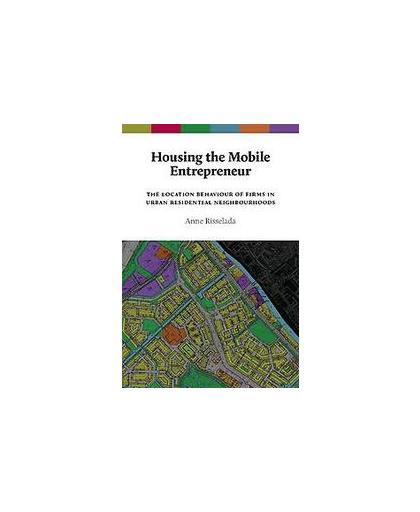

Housing the mobile entrepreneur. the location behaviour of firms in urban residential neighbourhoods, Risselada, Anne, Paperback
Available at:
Changing economic production processes have opened up new locational demands for firms. On-going technological advancements and other typical features of advanced urban economies have led to an increasingly diverse firm population displaying fragmented location patterns. This research focuses on those spatial configurations that fit the current economic fragmentation and changing location decisions. It does so by studying the location behaviour of firms in urban residential neighbourhoods.
This research demonstrates that the structure of the neighbourhood housing stock and the type of economic zoning in the local land-use plan can be linked to the location pattern of local firms. However, the research also shows that firms do not collectively prefer the same set of location factors. Consequently, when studying the location behaviour of firms in urban residential neighbourhood it is necessary to differentiate between firms housed in residential properties opposed to firms located in commercial properties. Firms in commercial properties largely confine to classical economic location factors. For home based-based businesses however, the incorporation of work-lifestyle characteristics, rather than the explanatory variables more commonly used in locational analysis, seems to provide an explanation.
Housing the mobile entrepreneur
Changing economic production processes have opened up new locational demands for firms. On-going technological advancements and other typical features of advanced urban economies have led to an increasingly diverse firm population displaying fragmented location patterns. This research focuses on those spatial configurations that fit the current economic fragmentation and changing location decisions. It does so by studying the location behaviour of firms in urban residential neighbourhoods. This research demonstrates that the structure of the neighbourhood housing stock and the type of economic zoning in the local land-use plan can be linked to the location pattern of local firms. However, the research also shows that firms do not collectively prefer the same set of location factors. Consequently, when studying the location behaviour of firms in urban residential neighbourhood it is necessary to differentiate between firms housed in residential properties opposed to firms located in commercial properties. Firms in commercial properties largely confine to classical economic location factors. For home based-based businesses however, the incorporation of work-lifestyle characteristics, rather than the explanatory variables more commonly used in locational analysis, seems to provide an explanation.
Beschrijving gevonden op BookSpot.nl
Housing the mobile entrepreneur
Changing economic production processes have opened up new locational demands for firms. On-going technological advancements and other typical features of advanced urban economies have led to an increasingly diverse firm population displaying fragmented location patterns. This research focuses on those spatial configurations that fit the current economic fragmentation and changing location decisions. It does so by studying the location behaviour of firms in urban residential neighbourhoods.<br /><br />This research demonstrates that the structure of the neighbourhood housing stock and the type of economic zoning in the local land-use plan can be linked to the location pattern of local firms. However, the research also shows that firms do not collectively prefer the same set of location factors. Consequently, when studying the location behaviour of firms in urban residential neighbourhood it is necessary to differentiate between firms housed in residential properties opposed to firms located in commercial properties. Firms in commercial properties largely confine to classical economic location factors. For home based-based businesses however, the incorporation of work-lifestyle characteristics, rather than the explanatory variables more commonly used in locational analysis, seems to provide an explanation.













